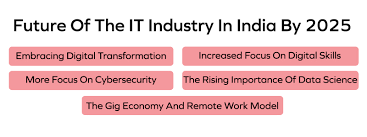People accept that India has seen the best of the IT industry are in for a surprise. India along with the other countries, will see the IT and IT enabled services industry not only developing but also outgrowing other industries with the pace of its expansion.
With the emergence of new path-breaking technologies like Artificial Intelligence, Internet of Things, Blockchain, Machine Learning, modern data science practices, cloud computing and big data and introduction and implementation of Microservices, Developer-Operations (devops) and automation in most of the industrial sectors the future of IT industry in India is bright.
It is estimated that in the coming 10 years the no. of jobs in the IT industry will get doubled along with better academic facilities, greater research for the subject of Information Technology and its practices.
Some important points related to the future of IT industry in India are:-
Automation is expected to create majority of the upcoming jobs in the IT sector.
Make in India and other such government schemes will help to create variety of new jobs in the field of IT and IT enabled services.
All industrial sectors will start making greater use of Information Technology to speed up their growth or enhance their efficiency.
IT and its tools will help in creating more jobs in other sectors as well like- banking, manufacturing, finance, sales.
IT related startups will flourish, especially those with innovative products like chatbots etc.
IT industry is one of the biggest employers in India.
Artificial Intelligence technique will improve the user experience.
[/list]
The future presents an opportunity for India to tackle the following three big challenges.
Skill development and employment for the future workforce. ..
Socioeconomic inclusion of rural India. ..
A healthy and sustainable future.
[/list]
IT Industry in India 2017
IT BPM industry revenues (excluding hardware) for the Financial Year 2016-17 is estimated to be at US$ 154 billion.
[/list]
IT sector contributed to India's GDP by 7.7% in the year 2016.
[/list]
In the Financial Year 2016, TCS stood as the market leader with about 10.4% contribution to India's IT and ITeS sector revenue.
[/list]
The IT market is quite competitive with the top 5 IT firms contributing over 25% to the total IT revenue.
[/list]
One of the biggest benefits that the computer and IT industry provides in India is the employment it can generate. India is now a major destination for IT outsourcing. There is no lack of IT job opportunities in India. In fact, India is expected to overtake the US to have the most number of software developers in 2019. We at Ambalika Institute of Management and Technology focuses on student’s IT skills to make them industry ready.
The article presents an optimistic and well-researched perspective on the future of India’s IT and IT-enabled services (ITeS) sector. It rightly emphasizes the nation’s stronghold in the global tech industry and the rapid transformations driven by AI, IoT, cloud computing, and automation. Indeed, India has consistently proven to be a fertile ground for IT innovation, employment, and outsourcing.
However, while the enthusiasm is justified, a practical viewpoint requires us to assess both opportunities and challenges with equal clarity.
Firstly, the prediction that IT jobs will double over the next decade is encouraging, but this surge must be coupled with large-scale upskilling. Our traditional educational systems, though improving, still lag behind the evolving demands of the tech ecosystem. Institutes like the Ambalika Institute are making strides in bridging this gap, but we must not ignore that many tier-2 and tier-3 educational institutions struggle with outdated curricula and limited access to hands-on tech exposure. A future-ready workforce must be equipped not just with degrees but with skills like AI modeling, cybersecurity, ethical hacking, and cloud infrastructure management.
Secondly, while automation will indeed create jobs, it will simultaneously displace millions of existing roles — especially in repetitive and support domains like BPOs and manual QA testing. Without a concrete reskilling framework, India risks widening its digital divide, leaving many workers behind in a rapidly evolving industry.
The article applauds schemes like Make in India — and rightly so — but these schemes have historically faced criticism for bureaucratic delays and underwhelming execution at the grassroots level. For IT startups and innovation hubs to thrive, especially in rural India, we must ensure robust internet infrastructure, ease of doing business, simplified taxation, and protection of intellectual property.
Moreover, while it’s true that IT contributes significantly to India’s GDP, our over-reliance on IT exports and services to foreign markets — particularly the US — makes the industry vulnerable to global political and economic shifts. Diversifying the markets and focusing on indigenous consumption of IT services will ensure long-term resilience.
Another point of concern is the socioeconomic inclusion mentioned in the article. The truth is, despite tech penetration, rural India still lacks adequate digital literacy and access. If the future of IT must be inclusive, then equitable digital access must be a national priority.
Lastly, while chatbots and AI tools are flourishing, there is an ethical dilemma around data privacy and AI regulation in India. The legal framework to monitor data usage and AI decisions is still in infancy, posing a threat to user trust and security.
In conclusion, the future of IT in India is undoubtedly bright — but its brilliance must be matched with responsibility, inclusive growth, robust education reforms, and ethical governance. Celebrating growth is vital, but so is confronting reality with clarity.
#FutureOfIT #IndiaTechRevolution #DigitalIndia #AIinIndia #SkillDevelopment #TechForAll #ITJobs #StartUpIndia #AutomationInIT #DigitalInclusion #TechPolicy

